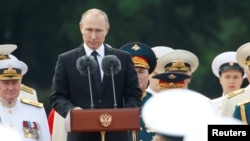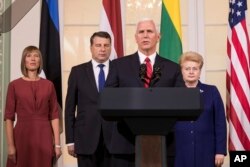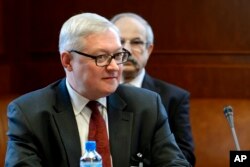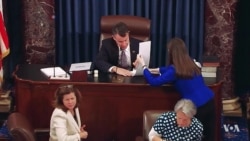Russian President Vladimir Putin is defending his massive cut in the size of the U.S. diplomatic mission in Russia, saying it had waited long enough for relations with Washington to improve.
Putin said he had hoped "the situation would perhaps change for the better. But it seems that even if the situation is changing, it is not for any time soon."
Kremlin spokesman Dmitry Peskov said an improvement of U.S.-Russia relations rest on "curing the worsening political schizophrenia" in Washington, but said the two countries remain "far away" from closer ties.
The Russian leader Sunday ordered the U.S. to cut its diplomatic staff of more than 1,200 in Russia by 755 people in response to new U.S. sanctions imposed against Russia for its meddling in the 2016 presidential election aimed at helping real estate mogul Donald Trump win the U.S. presidency.
It is believed to be the single largest cut ever in staffing at the U.S. Embassy in Moscow and consulates elsewhere in Russia, although many of those to be dismissed are likely Russians working in support positions. The cuts would leave both countries with the same number of staff and diplomats in the two countries, 455.
US reaction
The U.S. State Department called Putin's order "a regrettable and uncalled for act" and says it is assessing how to respond.
Vice President Mike Pence, on a visit to Estonia, said Monday, "We hope for better days, for better relations with Russia."
Putin told a Russian television network on Sunday that his government could take more retaliatory steps against the United States, but that he is "against it as of today."
The U.S. Congress approved the new sanctions last Thursday in a package that also included new measures against Iran and North Korea. On Friday, Russia's Foreign Ministry made the first announcement of the counter measures, saying the sanctions confirm the "extreme aggression" of the U.S. in international affairs.
In addition to sharply trimming the size of the U.S. mission in Russia, Moscow reclaimed two U.S. facilities, a recreational retreat and a storage facility.
"I think this retaliation is long, long overdue," Russian Deputy Foreign Minister Sergei Ryabkov said Sunday in an interview with ABC News' This Week.
He said Russia has a "very rich toolbox" at its disposal in terms of other possible moves.
"It would be ridiculous on my part to start speculating on what may or may not happen," Ryabkov said. "But I can assure you that different options are on the table and consideration is being given to all sorts of things."
The Russian diplomat also said he believes there are areas where the two countries can and should work together, including nonproliferation of weapons of mass destruction, counterterrorism, human trafficking, illegal immigration and climate change.
"We are ready, we are stretching our hand forward, we are hopeful that someone on the other side, President Trump included, but also others may see here a chance for a somewhat different way," Ryabkov said.
WATCH: Trump Expected to Sign New Russia Sanctions
Sanctions await signature
U.S. President Donald Trump has not yet signed the sanctions legislation, but the White House says he will.
As Congress negotiated the bill for weeks, Trump aides objected because of a provision that gives lawmakers 30 days to review and block any effort by the president to ease sanctions against Russia. That includes President Barack Obama's decision to close two Russian compounds and expel 35 diplomats because of Russia's interference in the election.
Political analysts in the United States had thought Trump, in an attempt to ease tensions with Putin, might overturn the Obama sanctions when he assumed power in January, but he did not.
Russian meddling
Since then, the early months of Trump's presidency have been consumed by numerous investigations of Russian meddling in the election, including whether Trump aides colluded with Moscow to help him win. The probes are also looking at whether Trump obstructed justice by firing FBI Director James Comey who was leading the agency's Russia investigation before another former FBI director, Robert Mueller, was named to take over the criminal investigation.
Moscow has rejected the conclusion of the U.S. intelligence community that Putin personally directed Moscow's interference in the election. Trump has dismissed the investigations as a "witch hunt" and an excuse by Democrats to explain his upset win over former U.S. Secretary of State Hillary Clinton.








